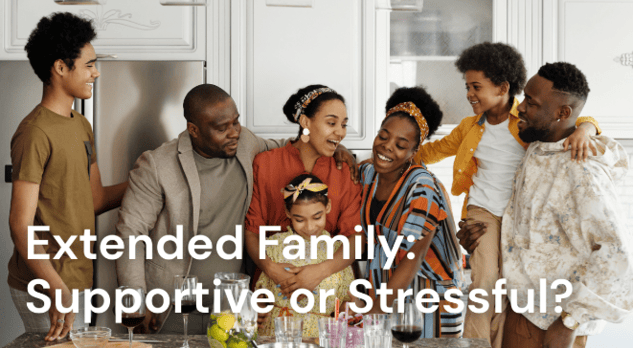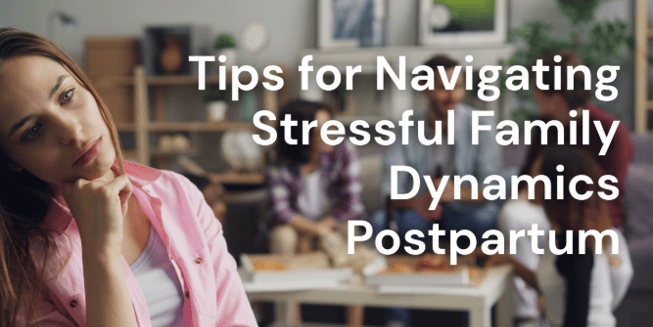Grandparents and Extended Family: Supportive or Stressful?
7/1/20254 min read
Welcoming a new baby into the family is often seen as a communal experience. Friends visit with food, neighbours drop off gifts, and extended family members, especially grandparents rush in, eager to help. In many cultures, this intergenerational support is a time Honored tradition. And for some new parents, the involvement of grandparents and extended family is a blessing.
But for others, it’s… complicated.
When postpartum depression (PPD), anxiety, or emotional exhaustion enters the picture, well-meaning involvement can sometimes feel like intrusion, and support can tip into stress. Expectations collide. Boundaries blur. And new parents may find themselves wondering: Are they helping—or making things harder?
At Peace Temple, we help families navigate the delicate dance of postpartum relationships, including those with grandparents and extended family. The truth is, support and stress often go hand-in-hand—and learning how to set boundaries while preserving connection is a skill that can change everything.


The Double-Edged Sword of Family Support
Grandparents and extended family can provide:
Hands-on help (meals, babysitting, errands)
Cultural or emotional wisdom
A sense of continuity or tradition
Reassurance for nervous new parents
But they can also bring:
Unsolicited advice
Pressure to parent a certain way
Judgment around choices (breastfeeding, sleep, etc.)
Emotional baggage or unresolved family dynamics
Especially in the postpartum period when sleep is scarce, hormones are crashing, and self-confidence is low, even small criticisms can feel like crushing judgments.
This is particularly true for parents navigating PPD, where feelings of inadequacy, guilt, or self-doubt are already heightened. When extended family fails to understand this, their “help” can unintentionally worsen symptoms.
Common Family Dynamics That Fuel Stress
1. The Overbearing Grandparent
This grandparent may mean well but doesn’t recognize boundaries. They might:
Show up unannounced
Criticize your parenting decisions
Take over baby care without asking
Dismiss your emotional needs with “tough love”
In the context of PPD, this dynamic can feel suffocating and disempowering.
2. The Absent-When-Needed Relative
On the flip side, some extended family members disappear when you need them most—perhaps because they don’t recognize the signs of PPD or don’t want to “get involved.” Their emotional absence can leave parents feeling even more isolated.
3. The Competitive or Judgmental Family Member
Whether it’s a sister-in-law with a “perfect baby” or a cousin who posts their sleep-training success on social media, these comparisons can sting. For a parent battling PPD, any implied failure real or perceived can deepen shame and doubt.
At Peace Temple, we hear this often: “I thought they’d be there for me. Instead, I feel worse after every visit.” That feeling matters—and it’s okay to name it.
When Support Is Supportive
Of course, not all family interactions are harmful. Many grandparents and relatives provide deeply meaningful care. Here's what supportive family looks like:
They ask before offering advice.
They respect boundaries and parenting decisions.
They validate your emotions instead of brushing them aside.
They offer practical help without strings attached.
They understand that your healing matters as much as the baby's care.
These are the relatives you lean on. And if you’re lucky enough to have one, cherish and involve them—with gratitude and clear communication.


Tips for Navigating Stressful Family Dynamics Postpartum
If extended family is causing tension, here are some ways to manage the relationship while prioritizing your mental health:
1. Set Clear Boundaries Early
Boundaries aren’t about rejection - they’re about creating space for recovery. Let family know:
Visiting hours or quiet time windows
What kind of help you do (or don’t) need
Topics that are off-limits (e.g., feeding choices)
Try phrases like:
“We’re figuring out what works best for us—thank you for respecting our choices.”
“We’re keeping visits short for now while we rest and adjust.”
“Right now, emotional support means more than advice.”
At Peace Temple, we help clients script and role-play these conversations—so they feel more confident speaking up.
2. Assign Specific Tasks
If someone wants to help but often oversteps, give them clear roles. Example:
“Can you take care of dinner on Tuesdays?”
“Would you mind doing the laundry while I nap?”
This frames support around tangible actions, not opinions or control.
3. Have a “Buffer Person”
If you have a partner or close friend, ask them to help communicate your needs to family—especially if you’re emotionally drained or afraid of conflict. Let them be your advocate when you need rest or space.
4. Limit Exposure as Needed
If someone continues to cause distress—even after gentle communication—it’s okay to create distance. That might mean:
Pausing visits
Muting social media
Delegating contact through a partner
Your mental health is not up for negotiation, even with family.
Helping Grandparents Understand PPD
Many older relatives weren’t raised in an era where postpartum depression was openly discussed. They may minimize or misinterpret symptoms.
What helps:
Share educational resources about PPD
Explain that what you’re experiencing isn’t personal - it’s a medical condition
Gently correct dismissive comments like “everyone feels tired” with “this is something deeper I’m getting help for”
You can say:
“I appreciate your concern. I’m also working with a therapist because this is more than exhaustion.”
“I know you didn’t have support like this when you had kids, but I really need it now.”
At Peace Temple, we offer family-inclusive sessions that help bridge the generational gap in understanding postpartum mental health.
When Family Becomes Found Family
Sometimes, the support we crave doesn’t come from relatives—it comes from chosen community:
A friend who listens without judgment
A neighbour who drops off food
A support group of other new parents
A therapist who creates a space to cry and heal
Support doesn’t need to be traditional—it just needs to be real, safe, and present. You are allowed to build the circle that nourishes you, even if it’s not the one you were born into.
Final Thoughts: Protecting Peace After Birth
The postpartum period is tender, raw, and deeply transformative. It’s a time when every word, visit, and interaction carries more weight. So be mindful of what (and who) enters that space.
You don’t owe access to anyone who drains you. You don’t have to tolerate guilt trips, criticism, or dismissive comments—especially when you’re already healing from depression or anxiety.
At Peace Temple, we believe that support should feel like support—not surveillance or stress. And we’re here to help you find, build, or redefine the network that holds you through this vulnerable season.
Because healing happens not just in solitude - but in safe, loving company.
